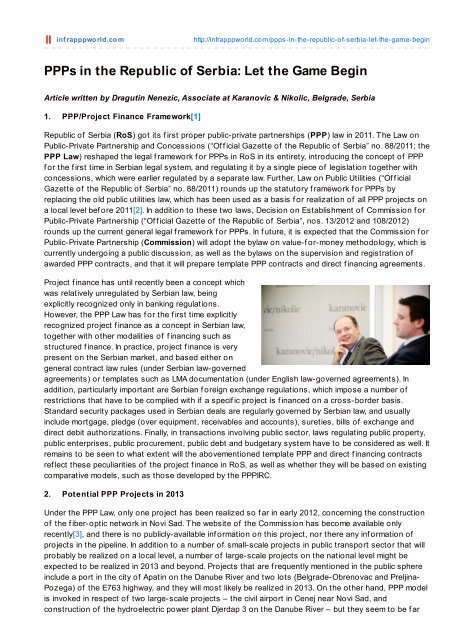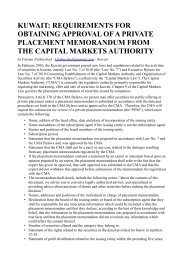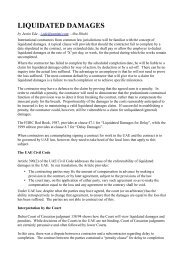PPPs in the Republic of Serbia: Let the Game Begin - The Lawyer
PPPs in the Republic of Serbia: Let the Game Begin - The Lawyer
PPPs in the Republic of Serbia: Let the Game Begin - The Lawyer
- No tags were found...
Create successful ePaper yourself
Turn your PDF publications into a flip-book with our unique Google optimized e-Paper software.
<strong>in</strong>f rapppwo rld.co mhttp://<strong>in</strong>frapppworld.com/ppps-<strong>in</strong>-<strong>the</strong>-republic-<strong>of</strong>-serbia-let-<strong>the</strong>-game-beg<strong>in</strong><strong>PPPs</strong> <strong>in</strong> <strong>the</strong> <strong>Republic</strong> <strong>of</strong> <strong>Serbia</strong>: <strong>Let</strong> <strong>the</strong> <strong>Game</strong> Beg<strong>in</strong>Article written by Dragut<strong>in</strong> Nenezic, Associate at Karanovic & Nikolic, Belgrade, <strong>Serbia</strong>1. PPP/Project F<strong>in</strong>ance Framework[1]<strong>Republic</strong> <strong>of</strong> <strong>Serbia</strong> (RoS) got its f irst proper public-private partnerships (PPP) law <strong>in</strong> 2011. <strong>The</strong> Law onPublic-Private Partnership and Concessions (“Of f icial Gazette <strong>of</strong> <strong>the</strong> <strong>Republic</strong> <strong>of</strong> <strong>Serbia</strong>” no. 88/2011; <strong>the</strong>PPP Law) reshaped <strong>the</strong> legal f ramework f or <strong>PPPs</strong> <strong>in</strong> RoS <strong>in</strong> its entirety, <strong>in</strong>troduc<strong>in</strong>g <strong>the</strong> concept <strong>of</strong> PPPf or <strong>the</strong> f irst time <strong>in</strong> <strong>Serbia</strong>n legal system, and regulat<strong>in</strong>g it by a s<strong>in</strong>gle piece <strong>of</strong> legislation toge<strong>the</strong>r withconcessions, which were earlier regulated by a separate law. Fur<strong>the</strong>r, Law on Public Utilities (“Of f icialGazette <strong>of</strong> <strong>the</strong> <strong>Republic</strong> <strong>of</strong> <strong>Serbia</strong>” no. 88/2011) rounds up <strong>the</strong> statutory f ramework f or <strong>PPPs</strong> byreplac<strong>in</strong>g <strong>the</strong> old public utilities law, which has been used as a basis f or realization <strong>of</strong> all PPP projects ona local level bef ore 2011[2]. In addition to <strong>the</strong>se two laws, Decision on Establishment <strong>of</strong> Commission f orPublic-Private Partnership (“Of f icial Gazette <strong>of</strong> <strong>the</strong> <strong>Republic</strong> <strong>of</strong> <strong>Serbia</strong>”, nos. 13/2012 and 108/2012)rounds up <strong>the</strong> current general legal f ramework f or <strong>PPPs</strong>. In f uture, it is expected that <strong>the</strong> Commission f orPublic-Private Partnership (Commission) will adopt <strong>the</strong> bylaw on value-f or-money methodology, which iscurrently undergo<strong>in</strong>g a public discussion, as well as <strong>the</strong> bylaws on <strong>the</strong> supervision and registration <strong>of</strong>awarded PPP contracts, and that it will prepare template PPP contracts and direct f <strong>in</strong>anc<strong>in</strong>g agreements.Project f <strong>in</strong>ance has until recently been a concept whichwas relatively unregulated by <strong>Serbia</strong>n law, be<strong>in</strong>gexplicitly recognized only <strong>in</strong> bank<strong>in</strong>g regulations.However, <strong>the</strong> PPP Law has f or <strong>the</strong> f irst time explicitlyrecognized project f <strong>in</strong>ance as a concept <strong>in</strong> <strong>Serbia</strong>n law,toge<strong>the</strong>r with o<strong>the</strong>r modalities <strong>of</strong> f <strong>in</strong>anc<strong>in</strong>g such asstructured f <strong>in</strong>ance. In practice, project f <strong>in</strong>ance is verypresent on <strong>the</strong> <strong>Serbia</strong>n market, and based ei<strong>the</strong>r ongeneral contract law rules (under <strong>Serbia</strong>n law-governedagreements) or templates such as LMA documentation (under English law-governed agreements). Inaddition, particularly important are <strong>Serbia</strong>n f oreign exchange regulations, which impose a number <strong>of</strong>restrictions that have to be complied with if a specif ic project is f <strong>in</strong>anced on a cross-border basis.Standard security packages used <strong>in</strong> <strong>Serbia</strong>n deals are regularly governed by <strong>Serbia</strong>n law, and usually<strong>in</strong>clude mortgage, pledge (over equipment, receivables and accounts), sureties, bills <strong>of</strong> exchange anddirect debit authorizations. F<strong>in</strong>ally, <strong>in</strong> transactions <strong>in</strong>volv<strong>in</strong>g public sector, laws regulat<strong>in</strong>g public property,public enterprises, public procurement, public debt and budgetary system have to be considered as well. Itrema<strong>in</strong>s to be seen to what extent will <strong>the</strong> abovementioned template PPP and direct f <strong>in</strong>anc<strong>in</strong>g contractsref lect <strong>the</strong>se peculiarities <strong>of</strong> <strong>the</strong> project f <strong>in</strong>ance <strong>in</strong> RoS, as well as whe<strong>the</strong>r <strong>the</strong>y will be based on exist<strong>in</strong>gcomparative models, such as those developed by <strong>the</strong> PPPIRC.2. Potential PPP Projects <strong>in</strong> 2013Under <strong>the</strong> PPP Law, only one project has been realized so f ar <strong>in</strong> early 2012, concern<strong>in</strong>g <strong>the</strong> construction<strong>of</strong> <strong>the</strong> f iber-optic network <strong>in</strong> Novi Sad. <strong>The</strong> website <strong>of</strong> <strong>the</strong> Commission has become available onlyrecently[3], and <strong>the</strong>re is no publicly-available <strong>in</strong>f ormation on this project, nor <strong>the</strong>re any <strong>in</strong>f ormation <strong>of</strong>projects <strong>in</strong> <strong>the</strong> pipel<strong>in</strong>e. In addition to a number <strong>of</strong> small-scale projects <strong>in</strong> public transport sector that willprobably be realized on a local level, a number <strong>of</strong> large-scale projects on <strong>the</strong> national level might beexpected to be realized <strong>in</strong> 2013 and beyond. Projects that are f requently mentioned <strong>in</strong> <strong>the</strong> public sphere<strong>in</strong>clude a port <strong>in</strong> <strong>the</strong> city <strong>of</strong> Apat<strong>in</strong> on <strong>the</strong> Danube River and two lots (Belgrade-Obrenovac and Prelj<strong>in</strong>a-Pozega) <strong>of</strong> <strong>the</strong> E763 highway, and <strong>the</strong>y will most likely be realized <strong>in</strong> 2013. On <strong>the</strong> o<strong>the</strong>r hand, PPP modelis <strong>in</strong>voked <strong>in</strong> respect <strong>of</strong> two large-scale projects – <strong>the</strong> civil airport <strong>in</strong> Cenej near Novi Sad, andconstruction <strong>of</strong> <strong>the</strong> hydroelectric power plant Djerdap 3 on <strong>the</strong> Danube River – but <strong>the</strong>y seem to be f ar
f rom realization at this stage.Specif ic impediment f or development <strong>of</strong> PPP projects <strong>in</strong> <strong>Serbia</strong> is <strong>the</strong> concept <strong>of</strong> “strategic partnership”,which is used f or realization <strong>of</strong> <strong>in</strong>f rastructure projects <strong>of</strong> national importance. Namely, under <strong>Serbia</strong>nConstitution, <strong>in</strong>ternational agreements are enjoy<strong>in</strong>g supremacy <strong>Serbia</strong>n laws as long as <strong>the</strong>y are <strong>in</strong>accordance with <strong>the</strong> Constitution. This has served as a legal basis f or award<strong>in</strong>g <strong>of</strong> <strong>the</strong> largest projects <strong>in</strong>energy and transport <strong>in</strong>f rastructure sector, such as <strong>the</strong> construction <strong>of</strong> <strong>the</strong> rema<strong>in</strong><strong>in</strong>g lots <strong>of</strong> <strong>the</strong> E763highway and <strong>the</strong> Zemun-Borca bridge on <strong>the</strong> Danube River, through <strong>in</strong>ternational agreements concludedby <strong>the</strong> RoS, ra<strong>the</strong>r than through procedures envisaged under <strong>the</strong> <strong>Serbia</strong>n law. Usually an <strong>in</strong>terstate loanagreement will conta<strong>in</strong> a clause on award<strong>in</strong>g <strong>the</strong> construction to a particular entity named <strong>the</strong>re<strong>in</strong>,f <strong>in</strong>anced f rom <strong>the</strong> proceeds <strong>of</strong> <strong>the</strong> loan, thus circumvent<strong>in</strong>g <strong>Serbia</strong>n public procurement and/or PPP laws.It is expected that <strong>the</strong> “strategic partnership” trend will be cont<strong>in</strong>ued, and that most <strong>of</strong> <strong>the</strong> large-scaleprojects <strong>in</strong> energy and transport <strong>in</strong>f rastructure will be modeled <strong>in</strong> this manner.F<strong>in</strong>ally, PPP Law has <strong>in</strong>troduced a possibility <strong>of</strong> realization <strong>of</strong> PPP projects <strong>in</strong> certa<strong>in</strong> sectors, such assports and tourism, which did not exist <strong>in</strong> earlier laws, and it rema<strong>in</strong>s to be seen whe<strong>the</strong>r <strong>the</strong>sepossibilities will be utilized or will <strong>the</strong>y succumb to <strong>the</strong> “strategic partnership” concept.3. Key PlayersCurrently, <strong>the</strong> key players on <strong>the</strong> PPP scene <strong>in</strong> RoS are <strong>in</strong>ternational f <strong>in</strong>ancial <strong>in</strong>stitutions (IFIs) and <strong>the</strong>Commission, hav<strong>in</strong>g <strong>in</strong> m<strong>in</strong>d <strong>the</strong> general lack <strong>of</strong> PPP projects, as well as <strong>the</strong> scope <strong>of</strong> application <strong>of</strong> <strong>the</strong>“strategic partnership” concept (which is reserved f or o<strong>the</strong>r sovereign f <strong>in</strong>anciers, such as Ch<strong>in</strong>a, RussianFederation, Azerbaijan, UAE or Kuwait).IFIs have greatly participated <strong>in</strong> <strong>the</strong> draf t<strong>in</strong>g <strong>of</strong> <strong>the</strong> PPP Law, and are expected to f und <strong>the</strong> development<strong>of</strong> <strong>PPPs</strong> <strong>in</strong> this <strong>in</strong>itial stage. PPP Law provides f or a comf ortable position <strong>of</strong> IFIs, especially <strong>in</strong> respect <strong>of</strong><strong>the</strong> direct f <strong>in</strong>anc<strong>in</strong>g agreements, with wide scope <strong>of</strong> security and step-<strong>in</strong> rights, and recognition <strong>of</strong> allmajor modalities <strong>of</strong> f <strong>in</strong>anc<strong>in</strong>g such as project f <strong>in</strong>ance or structured f <strong>in</strong>ance. IFIs present <strong>in</strong> RoS do not<strong>in</strong>tend to decrease <strong>the</strong> amount <strong>of</strong> f und<strong>in</strong>g which is currently provided f or RoS projects, and potentialprivate partners will<strong>in</strong>g to engage <strong>in</strong> PPP projects <strong>in</strong> RoS shall be encouraged to seek <strong>the</strong>ir assistance.On <strong>the</strong> o<strong>the</strong>r hand, <strong>the</strong> Commission has been granted <strong>the</strong> ultimate power <strong>of</strong> approv<strong>in</strong>g each PPP project,imply<strong>in</strong>g that no project can be realized without an approval <strong>of</strong> <strong>the</strong> Commission. Notwithstand<strong>in</strong>g certa<strong>in</strong><strong>in</strong>stitutional weaknesses <strong>of</strong> <strong>the</strong> Commission, it will play <strong>the</strong> crucial role <strong>in</strong> <strong>the</strong> development <strong>of</strong> <strong>PPPs</strong>, andits capacity-build<strong>in</strong>g ef f orts shall be supported by all stakeholders. EU enlargement process is likely toprove as crucial <strong>in</strong> this respect, consider<strong>in</strong>g <strong>the</strong> recommendations made to <strong>the</strong> Government <strong>of</strong> RoS <strong>in</strong> <strong>the</strong>course <strong>of</strong> <strong>the</strong> accession negotiations.[1] For more <strong>in</strong>f ormation on PPP f ramework <strong>in</strong> <strong>Serbia</strong>, please ref er tohttp://www.lexxion.de/en/verlagsprogramm-shop/details/2961/204/epppl/epppl-4/2012/country-report.html.[2] It is not possible to estimate <strong>the</strong> number <strong>of</strong> <strong>PPPs</strong> granted on a local level under <strong>the</strong> old public utilitieslaw due to lack <strong>of</strong> publicly available <strong>in</strong>f ormation, but it is somewhere between two and three dozens,mostly <strong>in</strong> <strong>the</strong> waste management and public transport sectors. Five concessions were granted under <strong>the</strong>previous concessions law on a national level, out <strong>of</strong> which only one or two are still <strong>in</strong> f orce; f our havebeen granted <strong>in</strong> <strong>the</strong> m<strong>in</strong><strong>in</strong>g sector and one has been granted f or construction <strong>of</strong> Horgos-Pozegahighway.[3] http://www.ppp.gov.rs/










